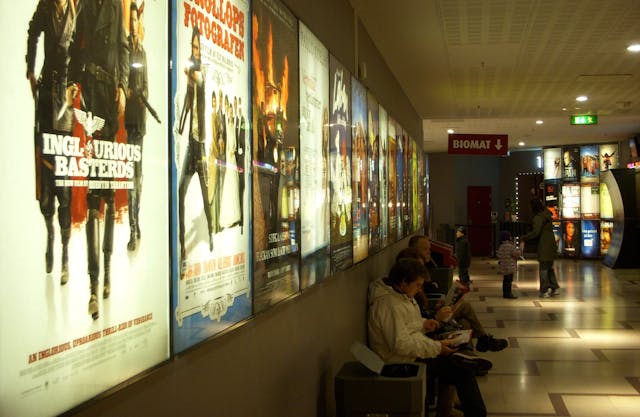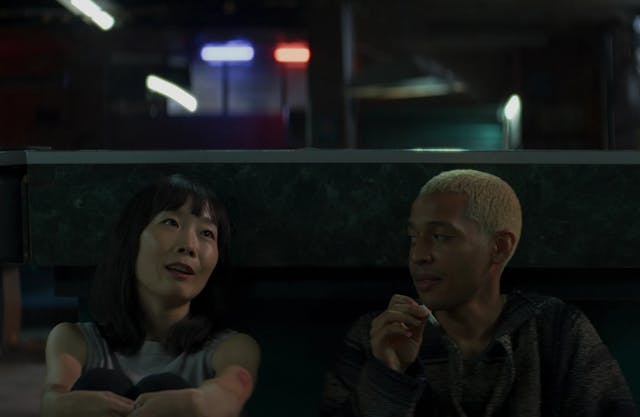
There is a big misconception about people who fall in love with movies and want to dedicate their lives to them. When you say you want to pursue a film career, everybody assumes you want to be either an actor or a director. And that’s alright. This happens because those two jobs have the most visibility outside the industry. Also, civilians don’t know how the sausage is made, how many people are engaged in the process, and how different and diverse they are in knowledge, preparation, and skill.
The truth is, up and down the filmmaking grid, there are many opportunities. Technical work follows the dynamics of apprenticeship. You may go to college or technical school, but you'll start from the bottom once you get your degree or certification. You begin doing internships, accrue experience and contacts, and then try to go up the chain doing job after job. The freelance way is not for the faint-hearted - ask the techs who went home during the 2023 writers and actors’ mega strike -. There can be more stability as staff at a post-production house or StudiStudioo.
But wait. Opportunities can be found long after the cameras stop rolling and the final cut is in the can. There is life beyond the studios. Consider the wonderful world of film distribution.
The Cast of Characters at a Film Distribution Operation
What is a Film Distributor, and What Makes them Tick?
A film distributor is the missing link between filmmakers and audiences. The biggest studios in the industry have their own distributing divisions, keeping the whole process in-house. Nice job, if you can get it. But perhaps independent film distribution companies are more open and amenable to newcomers.
Perhaps the top dog at an indie film distribution company is the person in charge of acquisitions. He or she has the power to decide which films to engage with and, by doing so, establishes the identity of the whole operation. Think of Jason Blum, steering Blumhouse to become the go-to place for horror. Or literate producer James Schamus, amassing at Bleeker Street a library of titles fit to program a New York-based Art House.
An acquisition executive haunts film festivals to identify movies worthy of his time and to place bids for distribution. It’s a competitive, break-neck process. Film markets offer a more sedated experience. At that point, the movies are barely entering the production process. You bet on talent, not necessarily on a finished product, to jump early onto the bandwagon and stave off the competition. The big boss may monitor progress from afar or jump into the trenches with his people.

The stars hog the spotlight at film festivals like Cannes, but distributors keep the business running. / Photo by Denis Makarenko©, courtesy of Dreamstime.
It sounds impossibly glamorous. You fly to Cannes and schmooze with the stars! You hit Sundance and identify new talent worthy of attention like a Kingmaker! It’s awesome, but you must be a people person to perform at top form, besides having exquisite taste and a good instinct to anticipate where the market will be in the near future. If that is not you, don’t worry. Other jobs might fit your profile.
Call the Marketing Department!
These are the brave souls who put all their creativity to the service of selling somebody else’s picture. Think of marketers, designers, writers, and conceptual artists who devise campaigns persuading the audience to let go of their time and money for a cinematic experience.
At its most basic, the job entails creating the standard promotional package: poster, lobby cards, film stills, trailers, and press kit. Beyond those elements lies unknown territory where they can mine for ways to turn something as normal as going to the movies into an event. Marketers must think like social scientists to know which buttons to push in the audiences’ psyches. Think of the geniuses at A24, who crafted a campaign filled with images fit for a dystopian disaster movie to sell their deadly serious political allegory “Civil War.” You can argue the advertising is misleading, but it did put butts in seats. The controversy expanded when they released some AI-generated posters of recognizable cities decimated by warfare. It's dispiriting to see the cool kids in the block falling for a fad that takes work away from designers, but for the beancounters, it's a win. The movie remained at the top of the box office in its second week of release.

The fall of Miami Beach: you won't see this on "Civil War," but the AI-generated poster enticed ticket buyers. / Poster courtesy of A24.
Down in the trenches, the marketing executives must consider all possible outlets for their campaign. The halcyon days of printed press, TV, and outdoor advertising are gone. Now, you have to consider the digital realm and such volatile elements as influencers, that is, social media personalities who are not necessarily bound to the traditional customs and ethics of the advertising industry - yes, there are ethics in the advertising industry! -. Those crazy kids must be a handful.
Also, a handful? The regular citizens coming for test screenings. Marketing reps may also schedule and organize test screenings to try to anticipate the audience’s reactions to the movie and to craft a promotional campaign that props up the positives - depending on where they are in the production process and the relationship with the production company, maybe even change the movie: cut or add scenes, call for reshoots, re-edit, you know, the works. Mind you, marketing execs don’t have the power to decide these things. That falls on whoever owns the copyright. It can be either the Studio, the producers, or the director. Still, marketers always have the opportunity to provide input.
Filmmakers' Best Friends: Public Relations experts
Ah, the PR mavens…those charming gals and fellas representing the film distributor to the world. Yes, they may interact with talent, but their day-to-day is less glitzy. They have to devise a communication strategy that puts the movie on the radar of public opinion as the planned release date approaches.
They reach out to their established networks of editors, writers, and critics to sell them the idea of giving coverage to the movie and reviewing it. The process is pretty straightforward for the big projects. Everybody wants to interview the big stars in that eagerly awaited tentpole. It’s a different game to convince the mainstream press to cover a Rumanian, black & white cinema verité drama. That is an uphill battle that can put the most persuasive sweet talker to the test. It helps if you like the product you are selling. That way, you can craft a compelling argument to convince those on the fence.
The PR team organizes junkets and press days, shepherds talent and press into sticking to schedule, oversees embargos, and tracks published coverage for reports and quotes to include in promotional materials. Those “Instant classic!” exclamations do not materialize out of thin air. It may sound like a rote, mechanical process, but creativity always comes into play. Just remember the great campaign for “Lost Highway” (David Lynch, 1997), which took a pan from Gene Siskel and Roger Ebert, the most influential critics of the day, and turned it into an irresistible, ironic enticement. It’s hard to tell who came up with the idea, but I’ll give the credit to the PR drone who found the damning quote.

Sales Team: New Movie on the Block, Never Seen Before
Acquisition zeroes in on worthy titles, and the sales team follows up to make the numbers work. They work out the details of the distribution deals that make you sign the deal. The sales executives sit across producers and exhibitors to streamline their interests regarding the movie. Will there be an upfront payment in the form of a Minimum Guarantee or not? If yes, how much will it be? How will box-office or licensing income be divided across time? How many screens will show the movie on opening weekend? Or perhaps an escalated platform release is more promising?
These are questions that the sales team, including accountants and administrators, will be able to analyze and answer. Everybody has their own ideas of how things should work. The best outcome for a sales executive is for all the parties involved to leave the negotiation table happy with the results.
Technical Staff: the Techies behind the Glitz
They roam promotional events, camera in hand. They sort out the footage for trailers. They edit videos for the electronic press kit and ever-more important social media accounts. Last but not least, they work with audiovisual labs and production houses to ensure the movie reaches exhibitors in the required media and up to professional standards. Whether good ol’ old-fashioned film, sturdy DCP, or satellite links to download the mother of all digital files…the techies are behind the final delivery of the movie and every other step in the distribution path.
If you love the nuts and bolts of filmmaking but don't necessarily look forward to getting into the circus ambiance of a movie set, this might be your dream job. You can start by getting a crash course in one of the most pressing issues in the industry: saving movies from extinction. Only brave and knowledgeable techies can save Hollywood from itself.
Now, How Do You Get That Sweet Distribution Job?
Love for movies is perhaps the most important feature you must have to get into film distribution. Besides that, some college prep comes in handy. Business degrees help out if you want to get on the sales team. Accountants are always necessary. Spoiler alert: marketing studies can lead to a happy career in marketing. Technical proficiency in graphic design will prime you for the design team. Knowledge in Film production, camera operation, video editing, and still photography will make you the jack-of-all-trades every marketing department needs.
And what if you want to become a film distributor? There are no degrees for that, but many roads can take you there. You can study film in a higher education institution or watch everything you can get your hands on. Get to know the industry firsthand by volunteering at film festivals and markets. Track down distribution companies and apply for internships. Observe and study the market. Learn what works and what doesn’t. Throughout that process, you will learn how things work and establish a network of contacts that, ideally, will push you upwards. Heck, you can start small, close to home. Organize a Film Society at school or a local community center or library. Apply for funding and reach out to distributors or local filmmakers to license movies to show.
If you are in a position to apply for an internship or a job opening, scan specialized sources like Entertainment Careers and Showbiz Jobs. Follow the companies that interest you in the usual hiring portals: LinkedIn, Glassdoor, ZipRecruiter, and Indeed. Visit the websites of every distribution company you like and see if they have openings available. If you don't have previous experience, an internship is the way to go, so the sooner you get in, the better.
Parting Words
At the 2016 Cannes Film Festival, South Korean director Hong Sang-soo shot "Claire's Camera" (2017), a gentle comedy about a French tourist (Isabelle Hupert) befriending a young Korean film distribution worker (Kim Min-hee) trapped in a love triangle with her boss and famous director. The movie does not say a lot about the job of film distributors on the site, but in the margins of a human comedy, you get some tantalizing looks at this particular line of work. It's not glamorous, but then again, you go for it because you love to bring movies to people. Remember, the film distribution business is not just about selling a product. It’s about sharing your love for film with others.
Watch “Lonely”
“Lonely” is a powerful reminder that no one is ever truly alone, and there is always someone out there who cares and wants to help.
Stream NowWant to get an email when we publish new content?
Subscribe today




























